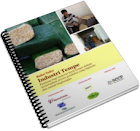Tempe and tofu have become staple foods and enjoy widespread acceptance and consumption in Indonesia. High concentrations of nutrients and protein, low price, and good taste have made these soy-based products a favorite food for most Indonesians. They can be deep fried, sautéed, or grilled, seasoned with salt, spices, or chili, eaten with soup, with rice, or alone as snacks. Soy used to be commonly grown in Indonesia, but due to a combination of government policy (import subsidies) and market forces (cheap soy beans from subsidized U.S. farmers), cultivation has fallen considerably. 98% of the soy used in Indonesian tempe and tofu production is imported from the United States.
Tofu and tempe value chains are key to the local economy, serving as a source of income to 85,000 businesses which support approximately 285,000 workers (40 to 50% of which are women) and generate a revenue of around 78 million USD. In Indonesia, the tofu and tempe market is mostly comprised of businesses in the informal sector. Workers are often marginalized migrants unable to obtain local residence permits. These MSMEs (micro-, small-, and medium-enterprises) are inefficient, not bankable, and produce low quality tofu and tempe. Lack of regulation of the sector has lead to substandard safety and sanitation. Moreover, smoke and liquid waste coming from the tofu and tempe production process contribute to environmental degradation, which is already a paramount threat in urban Indonesia.
A closer look into the tofu and tempe value chains reveal the sources of these problems:
The MSMEs are characterized by a low productivity at the factory level. The equipment is rusted, which reduces the shelf life of the tofu and results in inefficient use of resources (manpower and energy). Losses are estimated at 10 USD per day for the average MSME. Vendors and producers have limited market access due to their limited capacity and access to finance. Limited income and knowledge on the benefits of improved production and financial services inhibit investments as well as enterprise upgrade and growth.
Furthermore, tofu and tempe value chains face the problem of environmental pollution, examples include lack of waste management and the burning of firewood in processing. Consequently, the Indonesian government has shut down a number of factories due to environmental impact, which indicates that current small enterprises and workers may likewise be at risk of closure.
Inside the tofu and tempe factories, workers are exposed to excessive heat, humidity and smoke which make the workers susceptible to eye irritation and respiratory diseases. Workers spend 7-8 hours/day, 7 days/week in a closed, smoky environment. Protective gear is not used, and workers walk barefoot on floors topped with acidic residue. No formal health insurance or health compensation is normally available to these workers.
Another problem in the T&T sector is that some producers alter their products by adding toxic and illegal additives (e.g. formaldehyde) to increase the shelf-life of tofu, causing health issues for consumers, who are unable to differentiate between the healthy and non-healthy products. Tofu and tempe products lack branding and labelling, leaving consumers uninformed as to the conditions in which the tofu and tempe were produced. Thus, vendors who sell tofu/tempe produced in factories that apply Cleaner Production are unable communicate this to customers. This results in their inability to increase sales on a higher quality product. Furthermore, though the law requires registration with local government, the informality of most tofu and tempe MSMEs means that most businesses are unregistered. [to be Continued]
Tofu and tempe value chains are key to the local economy, serving as a source of income to 85,000 businesses which support approximately 285,000 workers (40 to 50% of which are women) and generate a revenue of around 78 million USD. In Indonesia, the tofu and tempe market is mostly comprised of businesses in the informal sector. Workers are often marginalized migrants unable to obtain local residence permits. These MSMEs (micro-, small-, and medium-enterprises) are inefficient, not bankable, and produce low quality tofu and tempe. Lack of regulation of the sector has lead to substandard safety and sanitation. Moreover, smoke and liquid waste coming from the tofu and tempe production process contribute to environmental degradation, which is already a paramount threat in urban Indonesia.
A closer look into the tofu and tempe value chains reveal the sources of these problems:
The MSMEs are characterized by a low productivity at the factory level. The equipment is rusted, which reduces the shelf life of the tofu and results in inefficient use of resources (manpower and energy). Losses are estimated at 10 USD per day for the average MSME. Vendors and producers have limited market access due to their limited capacity and access to finance. Limited income and knowledge on the benefits of improved production and financial services inhibit investments as well as enterprise upgrade and growth.
Furthermore, tofu and tempe value chains face the problem of environmental pollution, examples include lack of waste management and the burning of firewood in processing. Consequently, the Indonesian government has shut down a number of factories due to environmental impact, which indicates that current small enterprises and workers may likewise be at risk of closure.
Inside the tofu and tempe factories, workers are exposed to excessive heat, humidity and smoke which make the workers susceptible to eye irritation and respiratory diseases. Workers spend 7-8 hours/day, 7 days/week in a closed, smoky environment. Protective gear is not used, and workers walk barefoot on floors topped with acidic residue. No formal health insurance or health compensation is normally available to these workers.
Another problem in the T&T sector is that some producers alter their products by adding toxic and illegal additives (e.g. formaldehyde) to increase the shelf-life of tofu, causing health issues for consumers, who are unable to differentiate between the healthy and non-healthy products. Tofu and tempe products lack branding and labelling, leaving consumers uninformed as to the conditions in which the tofu and tempe were produced. Thus, vendors who sell tofu/tempe produced in factories that apply Cleaner Production are unable communicate this to customers. This results in their inability to increase sales on a higher quality product. Furthermore, though the law requires registration with local government, the informality of most tofu and tempe MSMEs means that most businesses are unregistered. [to be Continued]




























0 comments:
Posting Komentar